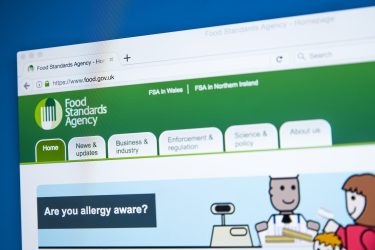A safer, more transparent food system
- Like
- Digg
- Del
- Tumblr
- VKontakte
- Buffer
- Love This
- Odnoklassniki
- Meneame
- Blogger
- Amazon
- Yahoo Mail
- Gmail
- AOL
- Newsvine
- HackerNews
- Evernote
- MySpace
- Mail.ru
- Viadeo
- Line
- Comments
- Yummly
- SMS
- Viber
- Telegram
- Subscribe
- Skype
- Facebook Messenger
- Kakao
- LiveJournal
- Yammer
- Edgar
- Fintel
- Mix
- Instapaper
- Copy Link
Posted: 23 January 2020 | Sam Mehmet (New Food) | No comments yet
New Food recently attended the Food Standards Agency’s (FSA) first 2020 Board Meeting to hear how it will manage the inevitable changes coming to the UK’s food systems, and ensure not only a smooth transition, but a securer supply chain.


The Food Standards Agency (FSA) January 2020 Board Meeting opened with remarks from the Chief Executive, Emily Miles, who outlined the agency’s key focus: modernising the way in which food businesses are regulated through the Regulating our Future campaign. This she said underlines the FSA’s mission of uniting the industry and the public in order to re-establish consumer confidence in food safety.
With every food-related illness and death, every incorrectly labelled product or avoidable allergic reaction, the need for the FSA to never become complacent is only further highlighted, Miles contended, and it must continue to analyse and identify the gaps in regulatory controls in the UK.
Food businesses along the entire supply chain are seeing change on a daily basis, and the board meeting stressed how the FSA must change alongside it. The development of data, and the tools in which to best utilise it, such as blockchain and machine learning, will allow the FSA to prioritise and target resources for risk-prevention as effectively as possible, she added.
“The FSA already has a statutory duty to provide advice to public bodies, and others, on the wider consumer interest in relation to food. This is not a duty limited to food and feed safety, it is the entirety of consumer interests in food,” said Heather Hancock, FSA Chair.
Regulating the food and beverage market
The expanding market of CBD dominated the regulation discussion at the meeting, with board members discussing how the current status of CBD products as ‘novel food’ is still imperative to the industry. Currently, no CBD products have been authorised or possess legal permitting health claims (regulated by the Department for Health and Social Care), the members confirmed. Yet, many products continue to appear on UK shelves. Consequently, the FSA is considering how to appropriately enforce this law.
This is not a duty limited to food and feed safety, it is the entirety of consumer interests in food
2,4-Dinitrophenol (DNP) was also noted to be an on-going risk to the public. DNP is a banned substance that has been marketed as a ‘slimming aid’, and Miles stated that the FSA is continuing to support gross-government work to control the substance. The FSA emphasised how essential it is for these substances to be controlled and removed from market, after the National Food Crime Unit (NFCU) supported investigations into several UK deaths.Miles explained that as the FSA has not been made aware of any safety incidents relating to CBD products, it is not planning to insist an immediate removal of the products, However, it is urging for industry to go through the appropriate authorisation processes in order for the agency to gather more information about this ingredient.
Surveillance and food data management
Julie Pierce, Director of Openness, Digital and Data at the FSA, and one of the speakers featuring at Food Integrity 2020, presented her annual surveillance report to the board. This provided a summary of the activities and progress of the modernisation of surveillance within the FSA. Pierce restated the importance of data and analytics to develop the FSA’s situational awareness, with the overall goal to develop a systematic approach to identify food and feed risks – including microbiological risks, food fraud, consumer attitudes, changes in business models and technological advancements.


“The development of data, and the tools in which to best utilise it, such as blockchain and machine learning, will allow the FSA to prioritise and target resources for risk-prevention as effectively as possible”
Pierce described how the recent developments in technology, alongside existing methods, are allowing the FSA to deliver solutions that had previously not been possible. She stressed the importance of the FSA continuing its collaborations and monitoring of industry development so to learn and build on experience at an appropriate pace.
The FSA is looking to develop an integrated system that will enable additional science-led, open and ethical data sharing. The idea is this will allow industry to make informed decisions and predictions.
“We need to be proactive, not reactive,” said Board Member, Margaret Gilmore.
Julie Pierce will be speaking at Food Integrity 2020. To find out more about the event register your interest here!
Preparing the food system for Brexit
On the 31 January 2020, the UK will exit the EU under the terms set out in the Withdrawal Agreement, Catherine Bowles, Acting Director of Strategy, Legal and Governance, explained. This means that the UK will enter into a transition period that will run until the end of December 2020. The board members assured that the FSA is prepared and will make sure the “high food and feed safety standards in the UK are maintained”.


On the 31 January 2020, the UK will exit the EU under the terms set out in the Withdrawal Agreement
The board members agreed that the FSA should assess whether the regulatory regime for food safety after Brexit will meet the statutory objectives of protecting consumers in relation to food. It was noted that, during the transition period, Union food and feed safety law will continue to apply in the UK. After this transition, Bowles said that the FSA will continue to have the same objective and bring the work that the FSA has delivered across surveillance, risk analysis, incidents and the compliance regime online.
We want to protect people, but we want them to have as wide and as fulfilling food lives as they possibly can, and we will call it out when we think this is not being supported by industry
The Northern Ireland Protocol, which sets out arrangements to address circumstances relating to the island of Ireland after Brexit, was said not to change the FSA’s purpose or role in Northern Ireland, but it will have consequences for the FSA. Bowles said that it will affect how the agency organises and arranges its work to ensure the regimes, and that the FSA will work closely with other government departments in Northern Ireland in discussions around the protocol.
Brexit preparations from the FSA will include:
- An IT programme for tracking issues through the risk analysis process, allowing new recruits to join the governance team
- An import/export regime that will provide assurance to the safety and authenticity of food – the FSA has worked with the Department for Environment, Food & Rural Affairs (Defra) to test the UK’s new import control system for the Import of Animals, Food and Feed System (IPAFFS)
- FSA Statutory Instruments (Sis) which ensure operability of retained EU law within the UK food system
- Enhanced NFCU presence
- Developments of common frameworks (food and feed safety, food compositional standards and labelling and nutrition health claims, composition and labelling).
Allergies and food sensitivities


It was agreed essential that the FH Strategy remains agile, so that the FSA can remain responsive to new evidence and opportunities
Next, Rebecca Sudworth, Director of Policy, presented her update on the current and planned activities to deliver the FSA’s Food Hypersensitivity (FH) Strategy, which looks to achieve change in how food hypersensitivity is understood and regulated in the UK. For example, new allergen labelling requirements for food pre-packed for direct sale (PPDS).
With board members raising concerns about the continuation of allergen-related recalls, such as the recent mass recall of pesto products containing undeclared peanuts across retailers throughout the UK, it was agreed essential that the FH Strategy remains agile, so that the FSA can remain responsive to new evidence and opportunities.
We need to be proactive, not reactive
“We want to protect people, but we want them to have as wide and as fulfilling food lives as they possibly can, and we will call it out when we think this is not being supported by industry,” Hancock said.
There were three main objectives of the FH Strategy outlined, which will be implemented in three phases over five years. These were:
- Safety: Consumers should have accurate, easily understandable information needed to make safe and informed food choices and effectively manage risk. Food businesses must understand their responsibilities and embed management of hypersensitivity in a strong food safety culture. The FSA will improve understanding of the causes and impact of allergen incidents and adverse reactions to the whole food system
- Trust: Consumers must trust the allergy information provided to them and use this to make informed decisions to effectively manage risk, and must trust that effective enforcement action is taken
- Choice: There should be better public understanding and acceptance of food hypersensitivity, leading to improved choice and inclusion. Hypersensitive consumers will have access to a wide range of food products and services including eating out safely.
With Natasha’s Law coming into effect on 1 October 2021, the FSA is now consulting on updates to its existing technical guidance to reflect the legislative changes. These updates aim to help businesses and enforcement authorities understand the new requirements, as well as support businesses as they work towards implementing them by the deadline.
As questions were opened to the board, it was said that education systems for those most at risk – generally the younger generation – must be improved so that people can be more aware of their own sensitivities and allergies before an incident can occur. Further collaboration with the National Health Service (NHS) around shared data and education was also noted to be a future focus for the FSA.
The FSA already has a statutory duty to provide advice to public bodies, and others, on the wider consumer interest in relation to food
The board meeting continued to discuss topics such as the National Food Strategy, which had a clear focus on ensuring an inclusive, sustainable, safe and consumer-led future for the UK food system and trade negotiations; the Nutrition Framework, which aims to standardise labelling claims so that consumers are best informed and best protected; updates to the NFCU strategies and how its bulletin aims to identify and assess trends of food crimes; and updates to the FSA’s risk analysis processes.
No one can predict the future, but the board meeting emphasised the organisation’s work to understand the changes that the food and beverage industry is seeing, and how it aims to ensure a smooth transition into a safer food system. Despite the fact we are still seeing recalls, foodborne illnesses and allergic reactions, it is clear that the industry and FSA alike are moving forwards in the journey towards food we can trust.
Related topics
Allergens, CBD hemp & cannabis, Data & Automation, Food Safety, Health & Nutrition, Outbreaks & product recalls, Regulation & Legislation, Supply chain, The consumer
Related organisations
Related regions
Related people
Catherine Bowles, Emily Miles, Heather Hancock, Julie Pierce, Margaret Gilmore, Rebecca Sudworth










